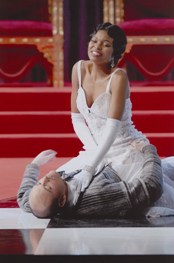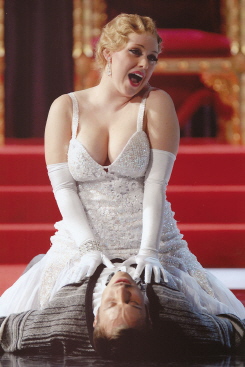Poppea – Pumeza Matshikiza /
Sophie Bevan with
Nerone – Huw Llywelyn / Nathan Vale
Ottone – Dawid Kimberg / Vojtech Safarik
Seneca – Kostas Smoriginas / Vuyani Mlinde
Arnalta – Alistair Digges / Ben Johnson
Ottavia – Stephanie Lewis / Sigridur Osk Kristjansdottir
Drusilla – Kim Sheehan
La Fortuna – Rita Therese Ziem
La Virtu / Damigella – Ida Folk Winland
Amor / Valletto – Eliana Pretorian
Lucano - John McMunn
Conductor – Michael Rosewell
Director – Paul Curran
Designer – Paul Edwards
Lighting – Robert A Jones

Pumeza Matshikiza with Huw Llywelyn
Sophie Bevan with Nathan Vale

Images: supplied by RCM
|
|
TWO PERFORMANCES: TWO REVIEWS
Translated from ancient Rome to the early years of the 20th century with and set against palatial backdrops created from super-enlarged period photographs, this production made totally cogent and entertaining visual theatre. It was the regrettable lapses into the realms of slapstick comedy (they might have fitted well enough with Offenbach) which I found at variance with Monteverdi's last and most glorious operatic score.
The most formal of aristocratic costumes and props were co-ordinated in black, white, gold and grey – cut across with great swathes of scarlet, as though to signal the sexual excesses of the court. The RCM clearly commands an enviable budget.
Pumeza Matshikiza (1st cast) made a lovely Poppea, moving with languid elegance (though in Scene I in danger of losing control of her scarlet sarong and revealing her all) and pouring out her arias in smoothly honeyed tone. Nerone is not a pleasant character, and Huw Llywelyn did not shirk from coarsening his voice as appropriate.
By contrast, Ottavia (Stephanie Lewis) was a model of queenly rectitude even in moments of rage and sang with equal security. Kim Sheehan made much of the hapless Drusilla.
Strong emerging voices were notable from both Dawid Kimberg (Ottone) and Kostas Smoriginas (Seneca). Direction and costuming turned Arnalta into something of a pantomime dame inappropriately, but this was well carried off by Alistair Digges and it did nothing to reduce some exceptionally fine singing.
Fortune (Rita Therese Ziem) and Virtue (Ida Folk Winland) clearly enjoyed their spiteful rivalry, and Eliana Pretorian in two smaller parts almost stole the show, both as the cabaret-girl Amor (with wig, top hat, tails and tights successively in scarlet, black and silver) and as the precociously roguish page boy.
Michael Rosewell kept things things moving at a sprightly pace, with spirited if rather patchy orchestral playing.
Serena Fenwick
LAST PERFORMANCE
Seeing this production in its final performance of four (this one with the "second" cast; that not to be understood pejoratively) reminded me that L'incoronazione di Poppea derives its infinite renewability from Busonello's libretto, surely one of the finest of any opera?
I cannot second my colleague in deploring the lapses into slapstick comedy and presentation of Poppea's nurse as inappropriate. These sudden irruptions of farce and satire into a romantic opera are intrinsic to the amoral I'incoronazione di Poppea, as are the comics in Shakespeare, but Curran extends them even into Seneca's death scene, usually given movingly as the emotional heart of the opera.
Poppea is an extremely "sexy" opera, and Curran emphasises that at all points, capitalising upon his youthful cast (some of whom doubled parts) with as convincing a display of all pervading eroticism as I can recall in any opera production. The ambiguities and psychological complexities are well brought out by Kate Hopkins' essay in the programme book.
There were subtle directorial touches in the characterisations throughout, not least in the management of the coronation scene and the final duet (not by Monteverdi); enough to make me regret not having seen both casts in a production whose many felicities may not have all been grasped first time.
Most disturbing was the mock lament at Seneca's suicide, with friends and disciples noting down his every word for posterity – an allusion to contemporary human tragedy journalism? That scene might have come off better if Vuyani Minde had delivered the famous farewell before his suicide more expressively.
Sex in its appetites and variety was well – and appropriately – shown by many of the characters, divine as well as earthly. The insatiability of the physically alluring Sophie Bevan as the ruthless, scheming Poppea & her suave, irascible Nerone, Nathan Vale was central. They made a lovely couple, well matched vocally. The force of adolescent sexuality was charmingly presented by lttle Eliana Pretorian with the tall, susceptible maid, and drunken, drugs-fired homosexual congress by Nerone with Lucan (all those couplings beautifully sung, even during some impressive lifts).
The orchestra was rough at first but soon settled; Lina Sayce a power of strength as always on theorbo (as also in the so different Trinity College of Music production of Poppea in 2002). Some of the singing was coarse and unremittingly loud for the small theatre, but the principals judged things right. The staging as conceived by Paul Edwards, and achieved by the RCM team, was a triumph, belying its financial constraints.
November has been an amazing month at RCM, with this great Poppea and the ground breaking Lachenmann Festival....
London's college opera is competitive with many an established company and, taking the best of these two casts, a filmed conflation from the RCM performances could have the potential for a L'Incoronazione de Poppea DVD to challenge successfully those of currently on sale which we have reviewed:. (Amsterdam: Opus Arte OA 0924 D and Schwetzinger Arthaus 100 108)
Peter Grahame Woolf
|



